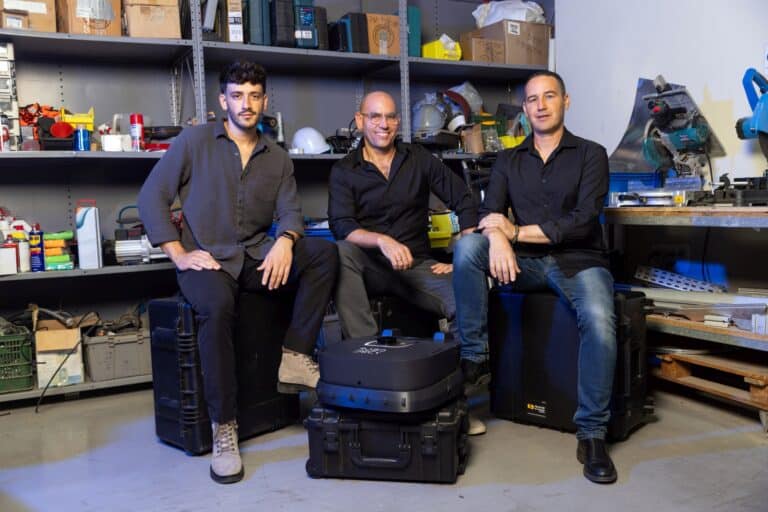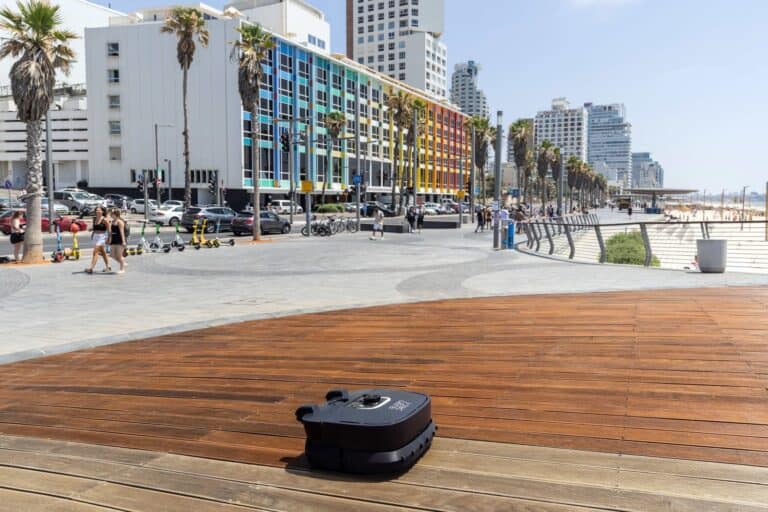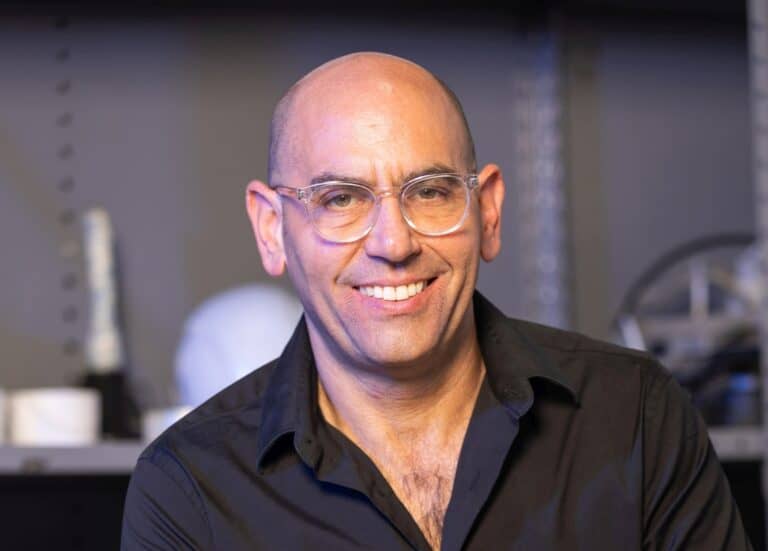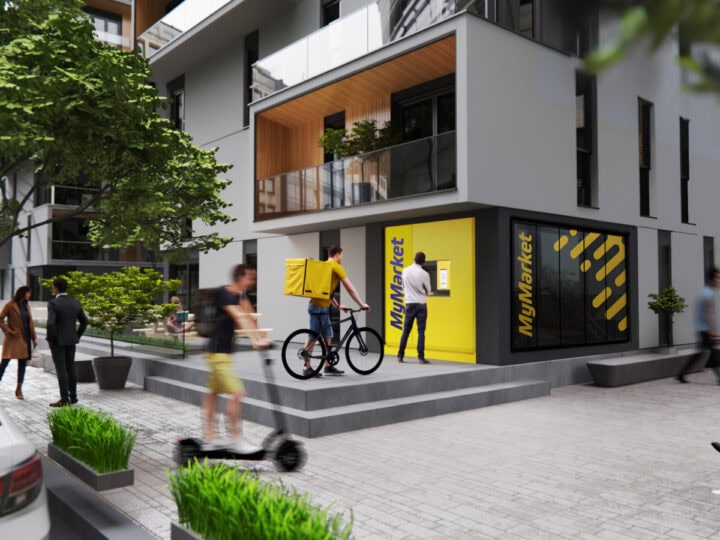Gal Frenkel built a wooden deck and pool in the backyard of his home in central Israel the summer after he had sold luxury wedding/bar mitzvah event planner Sky Productions (opening price for an event: $1 million).
Frenkel hosted a few parties there, and after the summer he didn’t think much about his pool and deck. When he went out to look at it the following spring, he was shocked.
“The whole area looked old and ruined and faded. I was so disappointed,” he tells ISRAEL21c. “I called the guy who installed the deck and said, ‘Nadav, you really messed it up.’ He started laughing. ‘Decks need ongoing maintenance,’ he explained. So, I asked him, ‘Can you do that for me?’ ‘Sure,’ he said. ‘The price will be 10,000 shekels.’”
Frenkel, a consummate entrepreneur, began researching how to fix a deck on the cheap – and maybe prevent this deterioration from happening in the future through proactive maintenance.
“Maintenance, I discovered, is very complex,” Frenkel says. “You need to go through the process at least once or twice a year. It’s a very tedious task and one where there’s been no innovation since 1926 when the pressure washer was invented. But this could be a sweet spot for robotics.”
Robotics, as in a sort of Roomba for outdoor decks?
Not exactly, RoboDeck Chief Product Officer Noam Rand tells ISRAEL21c.
RoboDeck, considerably larger than a Roomba, is built for preventative maintenance, not just cleaning. Like a Roomba, it has sensors that can watch out for drop-offs like stairs – or the edge of a raised platform.
But RoboDeck also uses artificial intelligence to identify dangerous objects it encounters on the way (a raised screw, a pothole, splinters or loose boards). The product employs a technique called SLAM – simultaneous localization and mapping – to scope out the landscape.
It has a proprietary spray system for adding stains and sealants and features a hybrid cleaning system with a special RoboDeck-built brush.
Huge untapped market
Frenkel was surprised by the sheer size of the untapped market.
According to the North American Deck and Railing Association (NADRA), in the United States alone, there are some 60 million outdoor decks – 10 million of them in commercial sites like hotels and office buildings, and 50 million in private homes.
RoboDeck’s robo-cleaner will be offered on a SaaS subscription basis (or as Rand describes it, RaaS – “Robot as a Service”).

The starting price will be low, with RoboDeck making money by selling reusable, removable cartridges to deliver the transparent stain that cleans the deck. The cost will vary depending on how much stain you need, which is in turn determined by the size of the deck along with weather patterns — snow, rain, humidity.
Rand estimates that RoboDeck will charge $1 per square foot “for the device, consumables, software and service.” That compares favorably, he says, with pricing in the US market of $3 to $5 per square foot for such a service.
Each cartridge lasts about an hour – the same amount of time the RoboDeck’s electric battery stays charged. Its standard power-tool battery can be swapped out by hand after an hour, along with the cartridge.
Less downtime

Although RoboDeck seems like a no-muss-no-fuss solution, what was wrong with how we used to clean decks in the pre-robotics era?
Downtime, Rand explains.
“We have a hotel customer at the Dead Sea with wooden decks around each room and the pool. Every time they have to treat the deck, they need to close the pool for three days. That costs more than doing the maintenance itself!”
Contrast that with RoboDeck, which can clean 1,000 square feet in 30 minutes – after which, people can use it immediately.
The hotel example Rand shared is not random. RoboDeck is focusing first on commercial sites and service providers, rather than private homes.
Sometimes the service provider will bring a RoboDeck to the property, and in other cases a property will buy its own RoboDeck.
Frenkel and Rand recommend that customers treat their decks four to six times a year, more than the once or twice a year most facilities are used to, because even RoboDeck can’t make a beat-up deck look new again.
Boardwalks, Bezeq and banks
RoboDeck has so far cleaned and treated some 60 decks for 20 different customers.
Perhaps the most impressive is the Tel Aviv boardwalk, which stretches for five kilometers from Jaffa Port in to the port in northern Tel Aviv (“the Namal”).
RoboDeck divided the boardwalk into sections of around 100 square meters. Not all of the boardwalk needed to be covered, as it alternates between wood in some places and concrete in others.

“One hundred square meters would take a team of two people two-and-a-half days to clean,” Frenkel tells ISRAEL21c, which would significantly disrupt the Tel Aviv boardwalk’s usability several times a year.
Other RoboDeck customers include the headquarters of Bezeq, Israel’s leading telecommunications firm, which has a 1,500-square-meter deck (“We divided it into 13 sections,” Frenkel says), Hadassah Medical Center and Silicon Valley Bank – yes, the same bank that went bankrupt in March 2023.
“Fortunately, they weren’t the ones paying the bill. We used a service provider. The bank went down but their decks still look good!” Rand notes.
Bullish prospects
Working with service providers makes a lot of sense since you can work with a select group of vendors rather than approaching each building or business separately. This is how, someday, a RoboDeck could come to homes: via a landscaper or pool cleaning company, which could offer the service as a paid upsell.

As an example, RoboDeck has a letter-of-intent with a pool cleaning company in Toronto. “They never offered deck maintenance before. Now they can, with a robot and a press of a button. It means additional revenue,” Rand explains.
RoboDeck has 10 people on staff, all in Israel other than cofounder Rand who is the company’s sole employee in the San Francisco Bay Area. RoboDeck has raised $2 million.
Frenkel is bullish on the company’s prospects.
“It’s not very often you come across such a demand,” he says. “You know you’ve hit on something right when customers come to you and want more than you can offer in terms of volume. We have a churn rate of zero, with no customers who didn’t renew their contract or who asked to stop it.”
Covid-19 may have prompted consumers to build more decks in their new country homes, but it also threw a wrench into RoboDeck’s initial development plans.
RoboDeck was accepted into the Hax accelerator in Shinzen, China. Unfortunately, it was the beginning of 2020.
“We went there in January for a month,” Frenkel explains. “Then they told us, ‘It’s the Chinese New Year, everything will be shut down; you won’t even be able to get food. Why don’t you take a month’s vacation back in Israel?’”
Frenkel, Rand and team never got the opportunity to return to China. “I still have a suitcase and a drill over there,” Frenkel laughs.
Check out RoboDeck here.
















